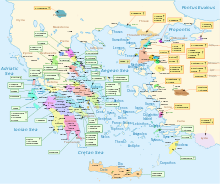
Back Troje Afrikaans Troja ALS ትሮያ Amharic Troya AN Trōia ANG طروادة Arabic طرواده ARZ Troya AST Troya Azerbaijani تروآ (شهر) AZB



Troy [1][2] was a city in north-west Asia Minor. It was the center of the Trojan War, as told in eight long epic poems, six from the Epic Cycle,[3] and two written by Homer, the Iliad and the Odyssey.[4]
Today it is the name of an archaeological site, the location of Homeric Troy, in Hisarlik in Anatolia, close to the seacoast in what is now Çanakkale province in northwest Turkey, southwest of the Dardanelles.
UNESCO has listed the archaeological site of Troy as a World Heritage Site.
- "The archaeological site of Troy is of immense significance in the understanding of the development of European civilization at a critical stage in its early development. It is, moreover, of exceptional cultural importance because of the profound influence of Homer’s Iliad on the creative arts over more than two millennia". UNESCO citation.[5]
- ↑ Greek: Τροία, Troia, also Ίλιον, Ilion; Latin: Trōia, Īlium. Trōia is the preferred Latin name for the city. Ilium is a more poetic term. Hittite: Wilusa or Truwisa; Turkish: Truva.
- ↑ Lewis, Charlton T.; Charles Short. "Ilium". A Latin Dictionary. Tufts University: The Perseus Digital Library.
- ↑ The poems of the Epic Cycle only survive in fragments.
- ↑ March, Jenny (2008). The Penguin Book of Classical Myths. Penguin Books. p. 294. ISBN 978-0-141-02077-8.
- ↑ UNESCO citation